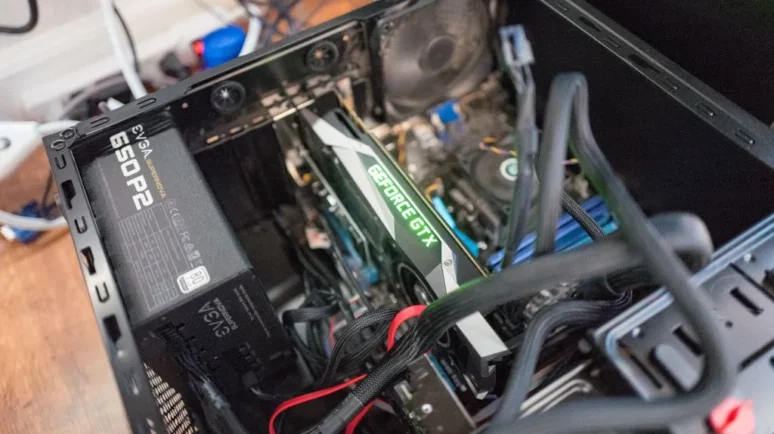Samsung Shares Fall 3% After HBM Chips Fail Nvidia Tests For Use in US

Samsung AI chips failed Nvidia tests for heat issues, raising concerns and causing stock to drop. This setback could benefit competitors. l Source: Zhang Hengwei/China News Service via Getty Images
Key Takeaways
- Samsung’s latest HBM chips, crucial for AI applications, haven’t met Nvidia’s standards due to problems with heat and power consumption.
- The news caused Samsung’s stock to drop while Nvidia’s and Micron’s weren’t affected.
- High-bandwidth memory (HBM) is a rapidly growing market due to increasing AI development.
- And Samsung is not the only big player in this field.
Samsung Electronics’ efforts to maintain its competitive edge in the high-bandwidth memory (HBM) market have hit a snag, as its latest chips failed to pass Nvidia’s stringent tests for artificial intelligence (AI) processor compatibility due to heat and power consumption issues.
This setback has sparked concerns about Samsung’s ability to keep pace with rivals SK Hynix and Micron Technology. As a result, Samsung’s stock has taken a hit, highlighting the high stakes and intense competition in the burgeoning HBM market.
Samsung’s HBM Chips Failed Nvidia Tests
Reuters reported that Samsung Electronics’ latest high-bandwidth memory (HBM) chips have yet to pass Nvidia’s tests for use in the US firm’s AI processors due to heat and power consumption issues. Three individuals briefed said the company’s latest HBM chips haven’t passed Nvidia‘s tests.
The problems pertain to Samsung’s HBM3 chips, the fourth-generation HBM standard widely used in GPUs for artificial intelligence, and the fifth-generation HBM3E chips that Samsung and its rivals are launching this year.
This is the first time the reasons behind Samsung’s failure to meet Nvidia’s tests have been reported.
Samsung stated that HBM is a customized memory product requiring “optimization processes in tandem with customers’ needs,” it is currently optimizing its products through close collaboration with customers.
The company declined to comment on specific customers. Following the initial Reuters report, Samsung refuted the claims, stating that “claims of failing due to heat and power consumption are not true,” and that testing was “proceeding smoothly and as planned.”
The sources said Samsung has been attempting to pass Nvidia’s tests for HBM3 and HBM3E since last year. Recent tests for Samsung’s 8-layer and 12-layer HBM3E chips failed in April. It is unclear if there’s a solution to these issues, but the three sources noted that the failures have raised concerns in the industry and among investors that Samsung could fall further behind competitors SK Hynix and Micron Technology in the HBM market.
Stock Reaction And Outlook
Shares of Samsung Electronics sank on Friday after Reuters reported that the company’s newest HBM chips had yet to pass Nvidia’s tests for use in artificial intelligence processors.
Samsung Electronics fell by 3.1% to 75,900 won, hitting a one-month low. This decline contributed to a 1.3% drop in South Korea’s benchmark KOSPI index.

In contrast, Nvidia’s stock recorded no fluctuation after the news. Shares of Nvidia increased by 9.3% on Thursday, reaching $1,037.99 per share, and gained an additional 1.1% in pre-market trading on Friday.
US rival Micron Technology also recently announced plans to begin production of advanced HBM chips, with demand expected to rise sharply amid increased AI development.
Micron’s stock remained almost flat on Thursday but rose by 1.4% to $127.99 per share after the news about Samsung’s HBM chip issues. This reflects the potential for Micron to gain market share in the wake of Samsung’s setbacks in Nvidia’s tests.
Battle With SK Hynix For HBM Chip Supremacy
High-bandwidth memory (HBM) is a critical battleground not only for Samsung Electronics. The Korean giant is in battle with Micron but the biggest competitor in this field is SK Hynix. The race to supremacy here is driven by soaring demand due to the increasing use of large-scale AI systems such as ChatGPT.
HBM is an advanced memory chip that vertically stacks dynamic random-access memory (DRAM ) dies to process more data quickly. These chips are deployed on graphics processing units (GPUs) for AI applications.
Samsung Electronics plans to integrate processing and advanced memory chips like HBM with 2.5D or 3D packaging technology . Samsung may achieve this integration as the only company globally with a chip business portfolio spanning memory chips, contract-based processing chip fabrication, and packaging. Samsung also plans to double the production capacity for its HBM products at its Cheonan factory in South Chungcheong.
However, experts warned that overheated competition could harm the overall chip industry, given that HBM currently accounts for only about 1% of the entire DRAM chip market.
As AI usage grows, experts expect the HBM market to surge from $2 billion in 2023 to $6.3 billion in 2028, offering Samsung and SK Hynix a lucrative opportunity amid anticipated losses in traditional memory chip businesses. Currently, these companies dominate over 90 percent of the global HBM market, with SK Hynix leading at 53%, followed by Samsung at 38%. SK Hynix focuses on HBM3, known for its MR-MUF technology.


